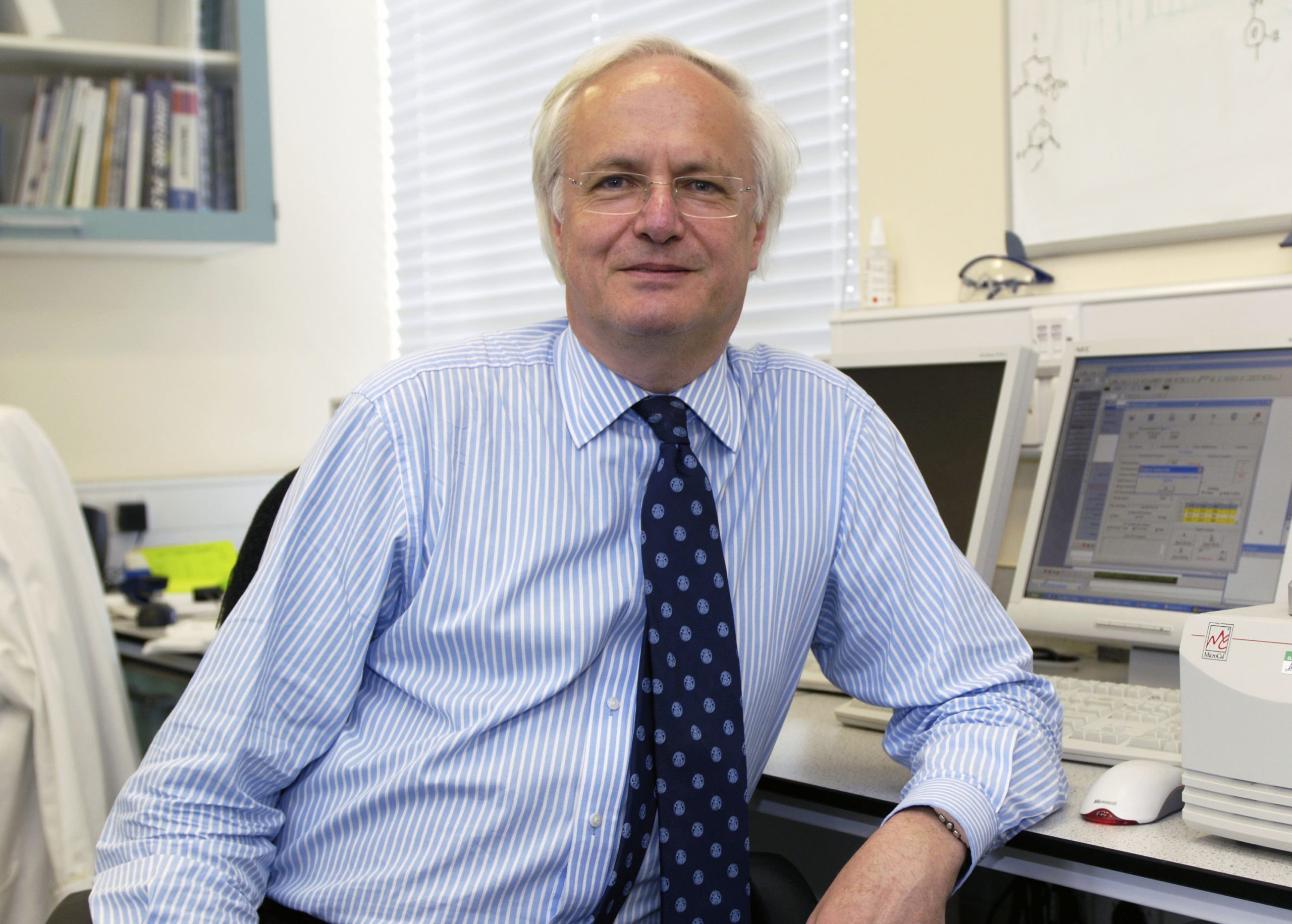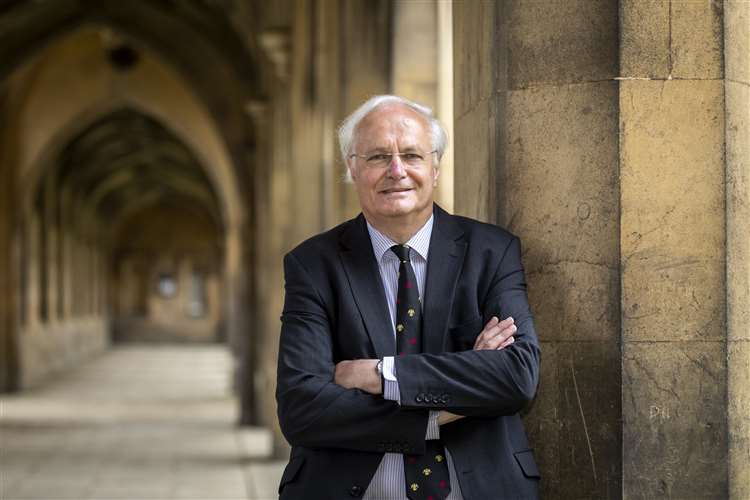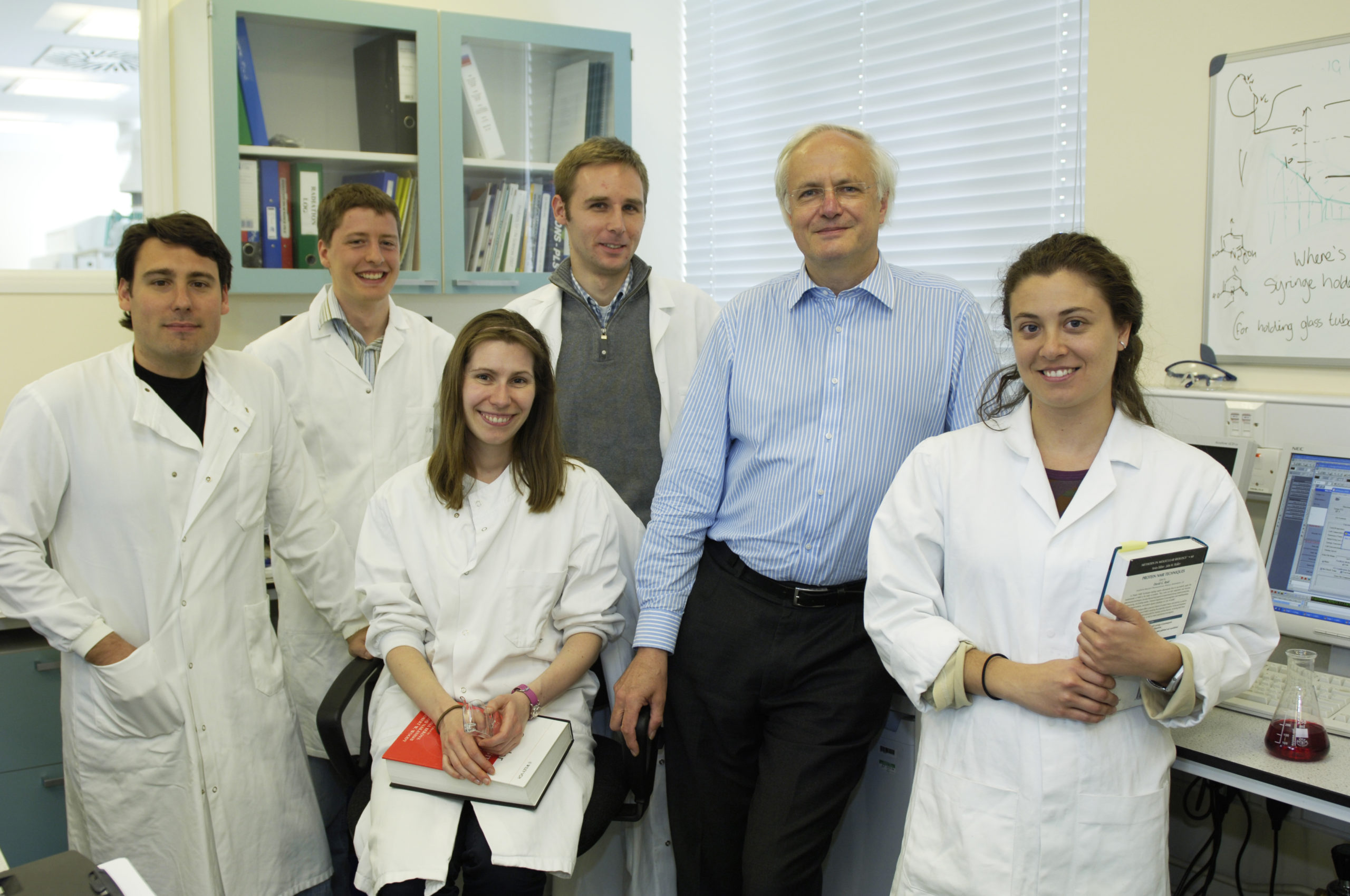Profoundly engaged in the College community, Chris always had time for students, staff, Fellows and alumni alike. Over the years many Johnians experienced first-hand his warmth and hospitality. Indeed, Chris was the antithesis of the stereotypical image of the aloof scientist: he was greatly interested in people and their stories and cared deeply about fairness.
Chris offered a remarkable contribution to both science and Higher Education. In recognition of this, St John’s is proud to honour his contributions in posterity through two student support schemes: the Dobson Free Places scheme for undergraduates and the Professor Sir Christopher Dobson PhD Scholarship.

Failure is part of academic research. The important thing is what one learns from failures. Dealing with apparent failure is very often the way to eventual success. History has shown us that if you put clever people and resources to look at difficult problems, often you can find a solution.
Chris Dobson
Everything that we do, from breathing to thinking, is dependent on protein molecules.
Proteins are formed by the linking together of smaller molecules – amino acids – into large structures that then fold into complex shapes, allowing them to work together to perform life’s functions.
When proteins misfold they are unable to fulfil their intended roles and instead clump together to form amyloid plaques: this is what causes diseases such as Alzheimer’s, Parkinson’s and type 2 diabetes. Amyloid plaques were first discovered as deposits in the brains of sufferers of dementia in 1906 by the neurologist Alois Alzheimer.
Until the 1990s it was believed that only very few, defective, proteins were susceptible to such misfolding. Professor Sir Christopher Dobson showed that in reality the amyloid state is one that almost any ‘normal’ protein can occupy: a breakthrough that reframed the thinking around how the resultant diseases can be prevented and treated.
Chris began his career applying nuclear magnetic resonance (NMR) spectroscopy – a method for analysing the molecular structure of a substance – to proteins. When one of his postdocs left a ‘normal’ unfolded protein in a spectrometer over a long weekend and returned to find that it had turned into a gel, Chris’s interest was piqued.
On closer inspection it transpired that the ‘perfectly ordinary’ protein had misfolded into an amyloid structure, hitherto only known from descriptions of disease and in contradiction to the prevailing wisdom that only a few defective proteins were able to misfold in this manner.
Knowing that ‘normal’ proteins could misfold with relative ease begged a further question: Why are protein-misfolding diseases not more prevalent? This led Chris to hypothesise that our bodies must have a means of preventing misfolding and keeping proteins in their functional states, and that it is a failure of these protective mechanisms that clears the way for protein-misfolding diseases. For Chris, this was a welcome hypothesis, as it suggested that ‘the disease-causing aggregates do not fight back and evolve like bacteria and viruses but are due to a lack of control in our normal housekeeping methods. They could, in principle, be easier to treat than many typical viral diseases, heart disease or cancer.’
In recent years Chris turned to drug discovery, screening a variety of agents for their ability to prevent the formation of toxic protein aggregates. Encouraging laboratory results suggest that this approach could transform the prevention and treatment of the diseases of ageing.
Chris was a true pioneer, bringing chemical thinking and methodology to a biological problem and inspiring a whole generation of scientists.
Professor Andrew Hamilton (1976), St John’s Honorary Fellow and President of New York University

Fairness is something I feel very strongly about: being fair and inclusive seems to me to be so obviously the right thing to do.
Chris Dobson
In tandem with his work as a groundbreaking scientist, Chris was also a uniquely inspiring and dedicated mentor.
Chris channelled much energy into the support and promotion of other researchers, and people often describe their encounters with him as ‘transformational’.
He had a knack for helping others understand their own talents, as well as the route to fulfilling them, and he was immensely proud that over 100 of his former students and postdocs had taken up academic positions all over the world.
I first met Chris on my return to science after some eight years out of research raising my young family. For many years now, I have realised just how fortunate I was to have had Chris as my mentor upon my return.
Professor Dame Carol Robinson, University of Oxford and President of the Royal Society of Chemistry
Chris arrived at Cambridge and St John’s College in 2001 by way of Oxford and Harvard and took up the position of John Humphrey Plummer Professor of Chemical and Structural Biology. In 2007 he became the 44th Master of St John’s, a role in which his passion for fairness came to the fore.
As the son of parents who left school at 14 without qualifications, Chris felt strongly that the duty of higher education institutions was to ‘optimise talent’ wherever it may originate, and under his leadership St John’s launched a means-tested financial support scheme for undergraduates that was more generous than that of any other higher education institution in the UK.
Taking on the Mastership of St John’s did not inhibit Chris’s scientific endeavours. He founded the Cambridge Centre for Misfolding Diseases in 2012; set up Wren Therapeutics, a biotechnology company, in 2016; and was instrumental in fundraising for the Chemistry of Health Building, which opened in 2018.
Chris also received some of the highest honours for science. He was awarded the Royal Medal; a knighthood for services to science and education; and the Heineken Prize from the Royal Netherlands Academy of Arts and Sciences, the major international prize for biochemistry and biophysics and, according to statistics, an excellent predictor for the subsequent award of the Nobel Prize.
Legacy is not only in ‘what’ but also in ‘how’, and so Chris leaves two legacies: one in the form of a record of groundbreaking science, and another as the community of students and researchers by whom he will be greatly missed.
Dr Karen Stroobants, Policy Adviser at the Royal Society of Chemistry

The most important things I have been involved with in my career have really come from students and other research workers who have found that their experiments do not work and have been fascinated by why.
Chris Dobson
Chris maintained that his scientific discoveries owed much to the talented people who came to work with him, mostly PhD students and other early-career researchers.
They, in turn, insist that their success came from the values that he instilled in them: to follow their instincts and to view any research failure as an opportunity for greater understanding. Chris’s own career benefited from this flexible mindset, since he came to the study of protein misfolding via a detour fuelled by curiosity.
Chris had an unwavering determination to ensure that we all reached our full potential, both as scientists and as human beings.
Professor Sheena Radford (1984), St John’s Honorary Fellow and Director of the Astbury Centre for Structural Molecular Biology at the University of Leeds
The Professor Sir Christopher Dobson PhD Scholarship for Science will preserve Chris’s ethos for future generations. Covering fees, maintenance and travel for students from anywhere in the world, the Scholarship will ensure that St John’s can continue to attract the very best scientists to Cambridge and provide them with the autonomy to follow their instincts, free from the increasingly rigid conditions of many external funding bodies.
The Scholarship is open to applicants from all of the natural sciences, in acknowledgement of Chris’s conviction that ‘an interdisciplinary and collaborative approach is needed to try to tackle the multifaceted problems of today’. We are delighted that the first Dobson PhD Scholar will be joining the College in Michaelmas 2024.
I feel so fortunate to have been supervised by someone so eminent but also so accessible. Chris was a true mentor: advising, encouraging and supporting me in the lab and beyond.
Ryan Geiser (2017), current Chemistry PhD student at St John’s and supervisee of Professor Dobson
We are pleased to announce that thanks to the generosity of the Johnian community, the Scholarship is now fully endowed and the inaugural Professor Sir Christopher Dobson PhD Scholarship was awarded in Michaelmas 2024.
Chris was enormously committed to St John's and our community, believing it to be something special and in need of protection. Now, through the Professor Sir Christopher Dobson PhD Scholarship, we collectively have the opportunity to do as well by Chris and his memory as he did by St John’s.
We therefore invite you to contribute to the Professor Sir Christopher Dobson PhD Scholarship endowment fund, from which the Scholarship will be financed in perpetuity.
DonateWhy does St John’s need to fundraise for this project? Read more about College finances.
